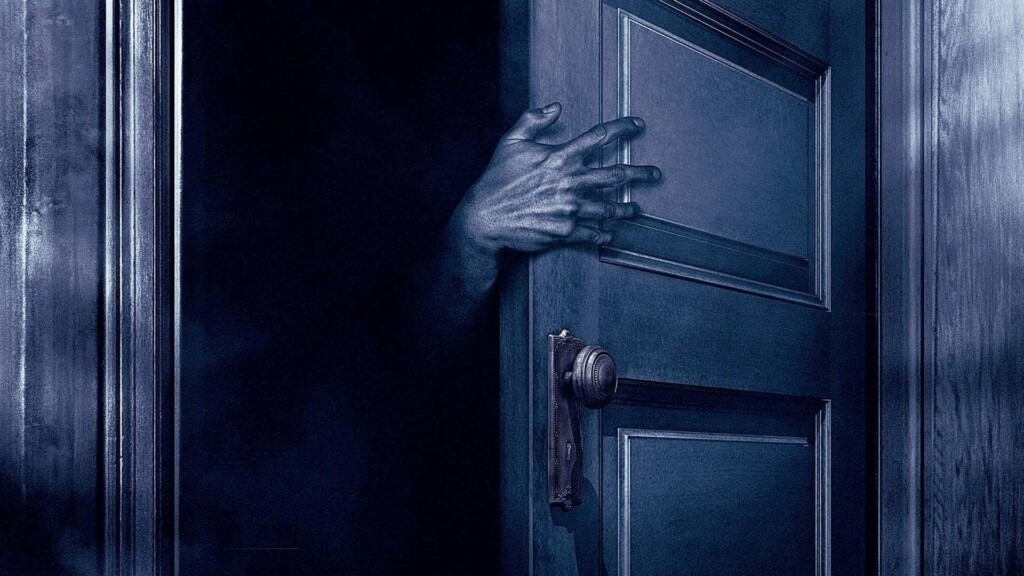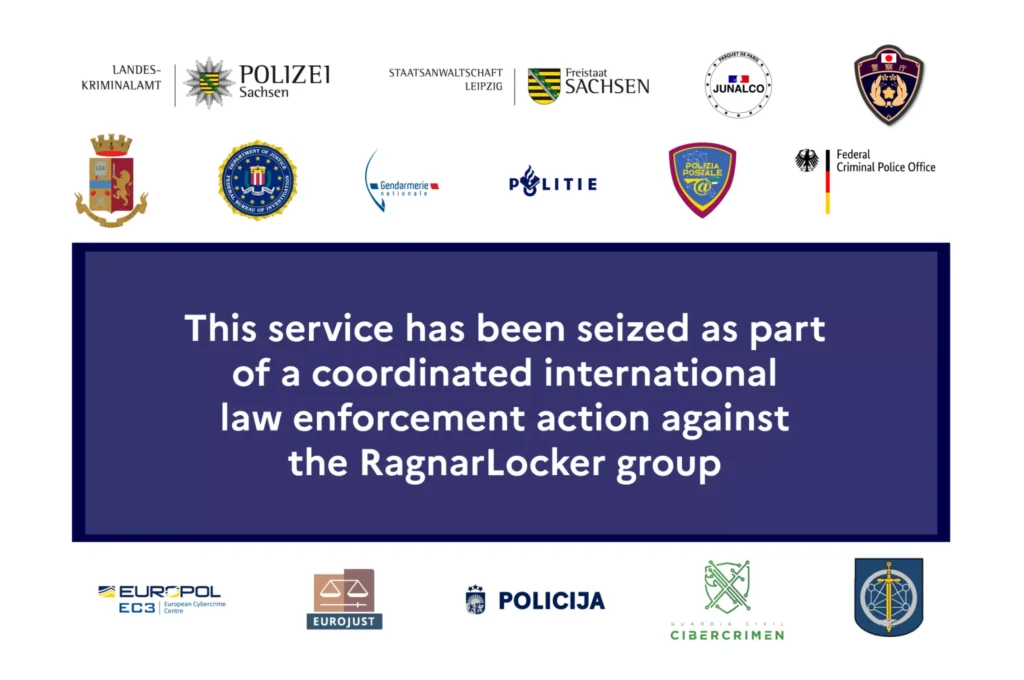Ragnar Locker Ransomware Gang Taken Down
By SCARS Editorial Team – Society of Citizens Against Relationship Scams Inc., portions by EUROPOL
Ragnar Locker Ransomware Gang Taken Down By Major International Police Operation Against Cybercriminals
Law enforcement and judicial authorities from eleven countries delivered a major blow to one of the most dangerous ransomware operations of recent years.
What is Ragnar Locker Ransomware
Ragnar Locker Ransomware is a type of malware that encrypts a victim’s files and demands a ransom payment in order to decrypt them. The ransomware is typically spread through phishing emails or malicious websites. Once a victim’s computer is infected, Ragnar Locker will encrypt all of their files, making them inaccessible. The ransomware will then display a ransom note demanding payment in Bitcoin or another cryptocurrency.
Ragnar Locker Ransomware is a particularly dangerous type of malware because it is able to encrypt a wide variety of file types. This makes it difficult for victims to recover their files without paying the ransom. In addition, Ragnar Locker is known for targeting large organizations, such as businesses and government agencies. This makes it a significant threat to critical infrastructure.
The Ragnar Locker Ransomware Shutdown
The coordinated action at an international level by Europol and Eurojust targeted the Ragnar Locker ransomware group. The group was responsible for numerous high-profile attacks against critical infrastructure across the world.
In an action carried out between 16 and 20 October, searches were conducted in Czechia, Spain and Latvia.
The “key target” of this malicious ransomware strain was arrested in Paris, France, on 16 October, and his home in Czechia was searched. Five suspects were interviewed in Spain and Latvia in the following days. At the end of the action week, the main perpetrator, suspected of being a developer of the Ragnar group, has been brought in front of the examining magistrates of the Paris Judicial Court.
The ransomware’s infrastructure was also seized in the Netherlands, Germany, and Sweden and the associated data leak website on Tor was taken down in Sweden.
This international raid follows a complex investigation led by the French National Gendarmerie, together with law enforcement authorities from the Czechia, Germany, Italy, Japan, Latvia, the Netherlands, Spain, Sweden, Ukraine, and the United States of America.
In the framework of this investigation, a first round of arrests was carried out in Ukraine in October 2021 with Europol’s support.
What kind of Malware is Ragnar Locker?
Active since December 2019, Ragnar Locker is the name of a ransomware strain and of the criminal group that developed and operated it.
This malicious actor made a name for itself by attacking critical infrastructure across the world, having most recently claimed the attacks against the Portuguese national carrier and a hospital in Israel.
This strain of ransomware targeted devices running Microsoft Windows operating systems and would typically exploit exposed services like Remote Desktop Protocol to gain access to the system.
The Ragnar Locker group was known to employ a double extortion tactic, demanding extortionate payments for decryption tools as well as for the non-release of the sensitive data stolen.
The threat level of Ragnar Locker was considered as high, given the group’s inclination to attack critical infrastructure.
Don’t Call the Cops
Ragnar Locker explicitly warned their victims against contacting law enforcement, threatening to publish all the stolen data of victimized organizations seeking help on its dark web ‘Wall of Shame’ leak site.
“All that the FBI/ransomware negotiators/investigators do is muck things up, so we’re going to publish your stuff if you call for help”, the Ragnar Locker ransomware gang announced on its hidden website.
Little did they know that law enforcement was closing in on them.
Back in October 2021, investigators from the French Gendarmerie and the US FBI, together with specialists from Europol and INTERPOL were deployed to Ukraine to conduct investigative measures with the Ukrainian National Police, leading to the arrest of two prominent Ragnar Locker operators.
The investigation continued ever since, leading to the arrests and disruption actions this week. Europol’s European Cybercrime Centre Europol supported the investigation from the onset, bringing together all the involved countries to establish a joint strategy.
Its cybercrime specialists organized 15 coordination meetings and two week-long sprints to prepare for the latest actions, alongside providing analytical, malware, forensic, and crypto-tracing support. A virtual command post was set up this week by Europol to ensure seamless coordination between all the authorities involved.
Eurojust Support:
The case was opened by Eurojust in May 2021 at the request of the French authorities. Five coordination meetings were hosted by the Agency to facilitate judicial cooperation between the authorities of the countries that supported the investigation. Eurojust set up a coordination center during the action week to enable rapid cooperation between the judicial authorities involved.
The Head of Europol’s European Cybercrime Centre, Edvardas Šileris, said:
“This investigation shows that once again international cooperation is the key to taking ransomware groups down. Prevention and security are improving, however ransomware operators continue to innovate and find new victims. Europol will play its role in supporting EU Member States as they target these groups, and each case is helping us improve our modes of investigation and our understanding of these groups. I hope this round of arrests sends a strong message to ransomware operators who think they can continue their attacks without consequence.”
Close cooperation between the involved law enforcement authorities was also supported by Europol’s Joint Cybercrime Action Taskforce (J-CAT), composed of cybercrime liaison officers posted to Europol’s headquarters.
The Following Agencies took part in the Investigation:
- Czechia: National Counter-Terrorism, Extremism and Cybercrime Agency of Police of the Czech Republic
- France: National Cybercrime Centre of the French Gendarmerie (Gendarmerie Nationale – C3N)
- Germany: State Criminal Police Office Sachsen (Landeskriminalamt Sachsen), Federal Criminal Police Office (Bundeskriminalamt)
- Italy: State Police (Polizia di Stato), Postal and Communication Police (Polizia Postale e delle Comunicazioni)
- Japan: National Police Agency (NPA)
- Latvia: State Police (Latvijas Valsts Policija)
- Netherlands: Police of East Netherlands (Politie Oost-Nederland)
- Spain: Civil Guard (Guardia Civil)
- Sweden: Swedish Cybercrime Centre (SC3)
- Ukraine: Cyberpolice Department of the the National Police of Ukraine (Національна поліція України)
- United States: Atlanta Field Office of the Federal Bureau of Investigation
The investigation was carried out in the framework of the European Multidisciplinary Platform Against Criminal Threats (EMPACT).
More:
- A Beginner’s Guide to the Dark Web for Investigators (scamsnow.com)
- BazarCall Scams: Call Centers Playing A Roll In Phishing & Ransomware Attacks (romancescamsnow.com)
- SCARS™ CYBER BASICS: Ransomware (romancescamsnow.com)
- Cyberwar – Understanding & Preparing For The Coming Cyberwar – Part 1 (romancescamsnow.com)
- Ransomware Guide – A U.S. Government Report – DHS CISA December 2020 (romancescamsnow.com)
- Fraudsters Steal $135 Billion In Fake COVID19 Jobless & Unemployment Claims (scamsnow.com)
- Qakbot Botnet Infrastructure Shattered After An International Operation Led By FBI/Europol Takes It Down (scamsnow.com)
- INTERPOL Identified Networks Linked to Financial Losses of More Than USD $40 Million (scamsnow.com)
- 16shop Phishing-As-A-Service Platform Taken Down (scamsnow.com)
- Interpol Operation Jackal – Arrested Over 100 (scamsnow.com)
- Europol Arrests 70 Phone Scammers Plus Kingpin (scamsnow.com)
- Hamas & Cybercrime – An Overview (scamsnow.com)
SCARS Resources:
- For New Victims of Relationship Scams newvictim.AgainstScams.org
- Subscribe to SCARS Newsletter newsletter.againstscams.org
- Sign up for SCARS professional support & recovery groups, visit support.AgainstScams.org
- Find competent trauma counselors or therapists, visit counseling.AgainstScams.org
- Become a SCARS Member and get free counseling benefits, visit membership.AgainstScams.org
- Report each and every crime, learn how to at reporting.AgainstScams.org
- Learn more about Scams & Scammers at RomanceScamsNOW.com and ScamsNOW.com
- Global Cyber Alliance ACT Cybersecurity Tool Website: Actionable Cybersecurity Tools (ACT) (globalcyberalliance.org)
- Self-Help Books for Scam Victims are at shop.AgainstScams.org
- Donate to SCARS and help us help others at donate.AgainstScams.org
- Worldwide Crisis Hotlines: International Suicide Hotlines – OpenCounseling : OpenCounseling
- Campaign To End Scam Victim Blaming – 2024 (scamsnow.com)
-/ 30 /-
What do you think about this?
Please share your thoughts in a comment below!
More ScamsNOW.com Articles
-/ 30 /-
What do you think about this?
Please share your thoughts in a comment above!
SCARS LINKS: AgainstScams.org RomanceScamsNOW.com ContraEstafas.org ScammerPhotos.com Anyscam.com ScamsNOW.com
reporting.AgainstScams.org support.AgainstScams.org membership.AgainstScams.org donate.AgainstScams.org shop.AgainstScams.org
youtube.AgainstScams.org linkedin.AgainstScams.org facebook.AgainstScams.org
ARTICLE RATING
TABLE OF CONTENTS
- Ragnar Locker Ransomware Gang Taken Down By Major International Police Operation Against Cybercriminals
- What is Ragnar Locker Ransomware
- The Ragnar Locker Ransomware Shutdown
- What kind of Malware is Ragnar Locker?
- Don’t Call the Cops
- Eurojust Support:
- The Following Agencies took part in the Investigation:
- More:
- SCARS Resources:
- SCARS Institute™ ScamsNOW Magazine
Society of Citizens Against Relationship Scams Inc. [SCARS]
CATEGORIES
MOST POPULAR COMMENTED ARTICLES
POPULAR ARTICLES
U.S. & Canada Suicide Lifeline 988
![NavyLogo@4x-81[1]](https://scamsnow.com/wp-content/uploads/2025/04/NavyLogo@4x-811.png)
ARTICLE META
WHAT PEOPLE ARE TALKING ABOUT LATEST SITE COMMENTS
See Comments for this Article at the Bottom of the Page
on The Uniqueness Of Scam Victims Or Fraud Victims – 2024: “unfortunately all true. It is highly stressful dealing with the aftermath. I am being sued for the money I borrowed…” Jul 6, 12:50
on Scam Victims & Mental Health Blaming – 2023 [UPDATED 2025]: “For most of my life words have defeated me, made me feel insignificant, unwanted, unneeded. For this reason it is…” Jul 5, 13:36
on Substance Abuse Susceptibility And Scam Victims – 2024: “It is understandable how some would feel that alcohol or substance abuse would be helpful in handling their feelings after…” Jul 1, 20:36
on Scam Victims Use Work To Avoid Healing: “The last 6 years have been the most difficult of my life. The pandemic, having both parents in the hospital…” Jun 29, 18:38
on Entitlement Mentality And How Scam Victims Often Lose Their Path To Recovery – 2024: “Thank you for this discussion of entitlement. I can see from the descriptions listed that I have not felt entitlement.…” Jun 29, 18:22
on Samurai Wisdom and Rituals for Clearing the Mind After Scam Trauma – 2025 – [VIDEOS]: “A great guide on how to move forward in our recovery process with a calm mind, cleansed on an ongoing…” Jun 28, 07:34
on Delayed Gratification and Patience in Scam Victim Recovery – 2025 – [VIDEOS]: “We want to recover quickly and… we make new mistakes. How not to speed up the recovery process, how to…” Jun 28, 06:41
on The Unique Injury Of Betrayal Trauma On Scam Victims – 2024: “Primarily because you did not see it coming” Jun 27, 23:57
on Changes In A Scam Victim’s Life: “I really detest the way my trust in others has been affected by the scamming I went through. I used…” Jun 27, 14:47
on The Unique Injury Of Betrayal Trauma On Scam Victims – 2024: “Betrayal Trauma is the worst feeling ever. Why does it seem so much worse when a scammer does that to…” Jun 27, 14:34
on EMDR Therapy For Scam Victims’ Trauma – A Part Of The Recovery Process For Many – 2024: “Very comprehensive article explaining all aspects of EMDR. I’d only heard of it before and now I have a much…” Jun 26, 19:01
on Forgiving Yourself After Surviving a Romance or Investment Scam – 2025: “Thank you for this valuable article. Self-forgiveness was for me the biggest step that led to my recovery. That also…” Jun 26, 17:28
on Counseling And Your Native Language: “These points make perfect sense. I can’t imagine trying to express complex emotions in a second language. I realize many…” Jun 26, 16:05
on Thought-Terminating Cliches – How What You and Others Say Stops Critical Thinking and Recovery for Scam Victims – 2025: “I didn’t realize that these “innocent phrases” clichés ending thoughts, can have such effect / negative -inhibiting / on our…” Jun 26, 14:48
on Scam Victim Resistance In Support Groups Therapy Or Counseling Can Destroy Opportunities For Recovery – 2024: “Working with either a support group or therapist to me means a self commitment to actively participating in the therapy.…” Jun 24, 21:01
on ‘I Just Want To Forget It’ – Denial & Avoidance Are Natural But Will Not Help Scam Victims On Their Path To Recovery From Scams – 2024: “My financial loss, the shock and betrayal of the crime ending all combined to fray my nerves and spend hours…” Jun 24, 20:10
on You Hate Being Told What To Do? How Your Rebellious Mentality Can Sabotage Your Recovery – 2025: “I am a bit of a rebel, and the moment someone tells me to do something, worse, does it even…” Jun 24, 15:04
on You Hate Being Told What To Do? How Your Rebellious Mentality Can Sabotage Your Recovery – 2025: “You are very welcome” Jun 24, 03:01
on You Hate Being Told What To Do? How Your Rebellious Mentality Can Sabotage Your Recovery – 2025: “This is a great article, which makes perfect sense as to why anyone would resist the help offered to them.…” Jun 23, 20:01
Important Information for New Scam Victims
Please visit www.ScamVictimsSupport.org – a SCARS Website for New Scam Victims & Sextortion Victims
SCARS Institute now offers a free recovery program at www.SCARSeducation.org
Please visit www.ScamPsychology.org – to more fully understand the psychological concepts involved in scams and scam victim recovery
If you are looking for local trauma counselors, please visit counseling.AgainstScams.org
If you need to speak with someone now, you can dial 988 or find phone numbers for crisis hotlines all around the world here: www.opencounseling.com/suicide-hotlines
Statement About Victim Blaming
Some of our articles discuss various aspects of victims. This is both about better understanding victims (the science of victimology) and their behaviors and psychology. This helps us to educate victims/survivors about why these crimes happened and not to blame themselves, better develop recovery programs, and help victims avoid scams in the future. At times, this may sound like blaming the victim, but it does not blame scam victims; we are simply explaining the hows and whys of the experience victims have.
These articles, about the Psychology of Scams or Victim Psychology – meaning that all humans have psychological or cognitive characteristics in common that can either be exploited or work against us – help us all to understand the unique challenges victims face before, during, and after scams, fraud, or cybercrimes. These sometimes talk about some of the vulnerabilities the scammers exploit. Victims rarely have control of them or are even aware of them, until something like a scam happens, and then they can learn how their mind works and how to overcome these mechanisms.
Articles like these help victims and others understand these processes and how to help prevent them from being exploited again or to help them recover more easily by understanding their post-scam behaviors. Learn more about the Psychology of Scams at www.ScamPsychology.org
SCARS INSTITUTE RESOURCES:
If You Have Been Victimized By A Scam Or Cybercrime
♦ If you are a victim of scams, go to www.ScamVictimsSupport.org for real knowledge and help
♦ Enroll in SCARS Scam Survivor’s School now at www.SCARSeducation.org
♦ To report criminals, visit https://reporting.AgainstScams.org – we will NEVER give your data to money recovery companies like some do!
♦ Follow us and find our podcasts, webinars, and helpful videos on YouTube: https://www.youtube.com/@RomancescamsNowcom
♦ Learn about the Psychology of Scams at www.ScamPsychology.org
♦ Dig deeper into the reality of scams, fraud, and cybercrime at www.ScamsNOW.com and www.RomanceScamsNOW.com
♦ Scam Survivor’s Stories: www.ScamSurvivorStories.org
♦ For Scam Victim Advocates visit www.ScamVictimsAdvocates.org
♦ See more scammer photos on www.ScammerPhotos.com
You can also find the SCARS Institute on Facebook, Instagram, X, LinkedIn, and TruthSocial
Psychology Disclaimer:
All articles about psychology and the human brain on this website are for information & education only
The information provided in this and other SCARS articles are intended for educational and self-help purposes only and should not be construed as a substitute for professional therapy or counseling.
Note about Mindfulness: Mindfulness practices have the potential to create psychological distress for some individuals. Please consult a mental health professional or experienced meditation instructor for guidance should you encounter difficulties.
While any self-help techniques outlined herein may be beneficial for scam victims seeking to recover from their experience and move towards recovery, it is important to consult with a qualified mental health professional before initiating any course of action. Each individual’s experience and needs are unique, and what works for one person may not be suitable for another.
Additionally, any approach may not be appropriate for individuals with certain pre-existing mental health conditions or trauma histories. It is advisable to seek guidance from a licensed therapist or counselor who can provide personalized support, guidance, and treatment tailored to your specific needs.
If you are experiencing significant distress or emotional difficulties related to a scam or other traumatic event, please consult your doctor or mental health provider for appropriate care and support.
Also read our SCARS Institute Statement about Professional Care for Scam Victims – click here
If you are in crisis, feeling desperate, or in despair, please call 988 or your local crisis hotline.
More ScamsNOW.com Articles
A Question of Trust
At the SCARS Institute, we invite you to do your own research on the topics we speak about and publish. Our team investigates the subject being discussed, especially when it comes to understanding the scam victims-survivors’ experience. You can do Google searches, but in many cases, you will have to wade through scientific papers and studies. However, remember that biases and perspectives matter and influence the outcome. Regardless, we encourage you to explore these topics as thoroughly as you can for your own awareness.
















![scars-institute[1]](https://scamsnow.com/wp-content/uploads/2025/04/scars-institute1.png)
![niprc1.png1_-150×1501-1[1]](https://scamsnow.com/wp-content/uploads/2025/04/niprc1.png1_-150x1501-11.webp)
